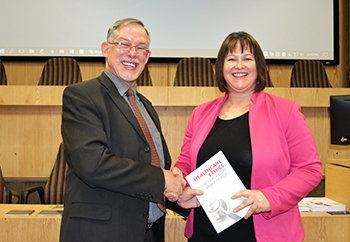Latest News Archive
Please select Category, Year, and then Month to display items
19 November 2018
|
Story Charlene Stanley
|
Photo Charlene Stanley
 Prof John Mubangizi, Dean of the Faculty of Law, encouraged delegates at the Fifth Annual International Mercantile Conference to share ideas on best international practice in their various fields.
Prof John Mubangizi, Dean of the Faculty of Law, encouraged delegates at the Fifth Annual International Mercantile Conference to share ideas on best international practice in their various fields.
“Don’t say anything online that you wouldn’t want plastered on a billboard with your face on it.”
This famous quote by international tech expert Erin Bury should be a guiding light when it comes to online habits in the workplace, according to Francois Cilliers, UFS Lecturer in Mercantile Law.
In his presentation Could Social Media be the Gateway to Employment Discrimination? he warned that employees have a responsibility not to bring their employers in disrepute through their comments on social media.
“Posts, updates, tweets, and comments are considered to be publications and can therefore never be seen as privileged information,” he explained.
Responsibility on employees and employers alike
He pointed out that employers also had a responsibility regarding the way in which they use the information about prospective employees obtained via social media.
“Nowadays, approximately 75% of companies hire through social media. In the US, recruiting companies spend hours researching candidates, making full use of what they can find on social media. It was found that 50–80% of employers frowned upon posts and pictures featuring drug and alcohol abuse, profanity, and bad grammar.”
He warned that employers needed to tread lightly, as a decision not to employ someone as a result of information on the prospective employee’s political views and sexual orientation could constitute unfair discrimination as set out in the Employment Equity Act.
“An employer who wishes to use a screening process (utilising social media) has to prove that the information and the process is objectively necessary and can be justified with reference to the inherent requirements of the job,” he explained.
“As technology and electronic systems advance, so too should the applicable labour laws.”
Cilliers’ presentation formed part of the Fifth Annual International Mercantile Law Conference recently hosted by the Faculty of Law on the Bloemfontein Campus.
Incorporating new technology in teaching and research
“This conference is an opportunity to share ideas on best practice in what is perceived as a ‘difficult’ field within Law,” said Prof John Mubangizi, Dean of the Faculty of Law, as he opened the proceedings. Topics in the discussion sessions ranged from Racism in the workplace and The underrepresentation of females in the judiciary, to Decriminalisation of cannabis: A recipe for healthy employer-employee relations?
“Conferences such as these help us to take advantage of the newest developments in technology to advance our teaching and research,” said Prof Mubangizi.
“To quote Einstein: ‘We can’t solve problems by using the same kind of thinking we used when we created them.’”
Ethics at the heart of healthcare practice
2017-05-17

Prof Gert van Zyl during the launch of Health
Ethics for Healthcare Practitioners with
Prof Laetus Lategan at the Central
University of Technology.
Photo: Supplied
The Central University of Technology (CUT) in partnership with the University of the Free State (UFS) launched a newly published book: Health Ethics for Healthcare Practitioners that aims to raise awareness among healthcare practitioners and patients about various unethical challenges faced by healthcare services in both the private and public sectors.
Prof Laetus Lategan, Director of Research Development and Postgraduate Studies at CUT, and Prof Gert van Zyl, Dean of the UFS Faculty of Health Sciences, are the co-editors of the book intended to provide a moral guide to healthcare professionals when dealing with their patients.
Holistic approach to healthcare practice
Their work places renewed emphasis on the importance of healthcare ethics. This is due to a diversifying range of healthcare services and the imminent collapse of the public healthcare service sector; most notably in developing countries. The authors particularly focus on how their findings can be integrated into real-life situations.
The book looks at modern-day healthcare ethics and how they apply to both patients and healthcare practitioners including doctors, professional nurses and therapists. It is an elaborate reference book that will help healthcare practitioners to make informed decisions should they be faced with ethical dilemmas in their practices and assist them to gain a better understanding and devise solutions to problems faced by communities.
Academic journey and partnerships forged
Prof Van Zyl said the book had been a joyful journey of collaboration between the two universities, a journey of academic colleagues who become friends. He explained that they wanted to focus on creating new approaches to healthcare from an ethical perspective, to provide a guide and reference on ethics, not only to healthcare practitioners, but also to patients. “We hope this book will make a difference in healthcare delivery,” he concluded.
Prof Lategan said modern science needed to become more interdisciplinary, which would transcend the way science was conceived. “The essence of healthcare is to be of service to other people and have relationships with other people. I think it’s high time for us to start caring for one another, especially in the academic environment. If we are really looking after the health of other people, whether it is mental, spiritual or physical health, it starts with caring for other people.”